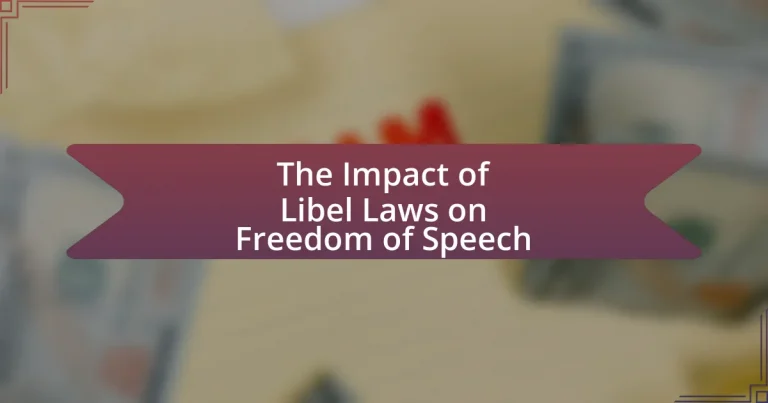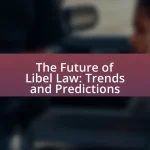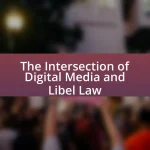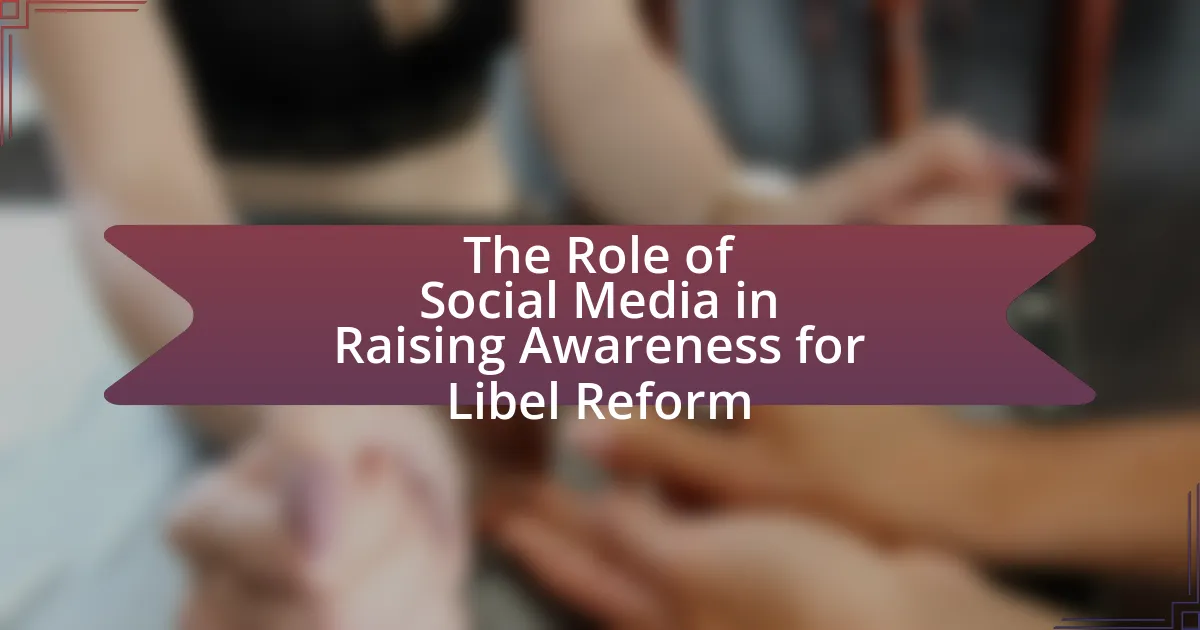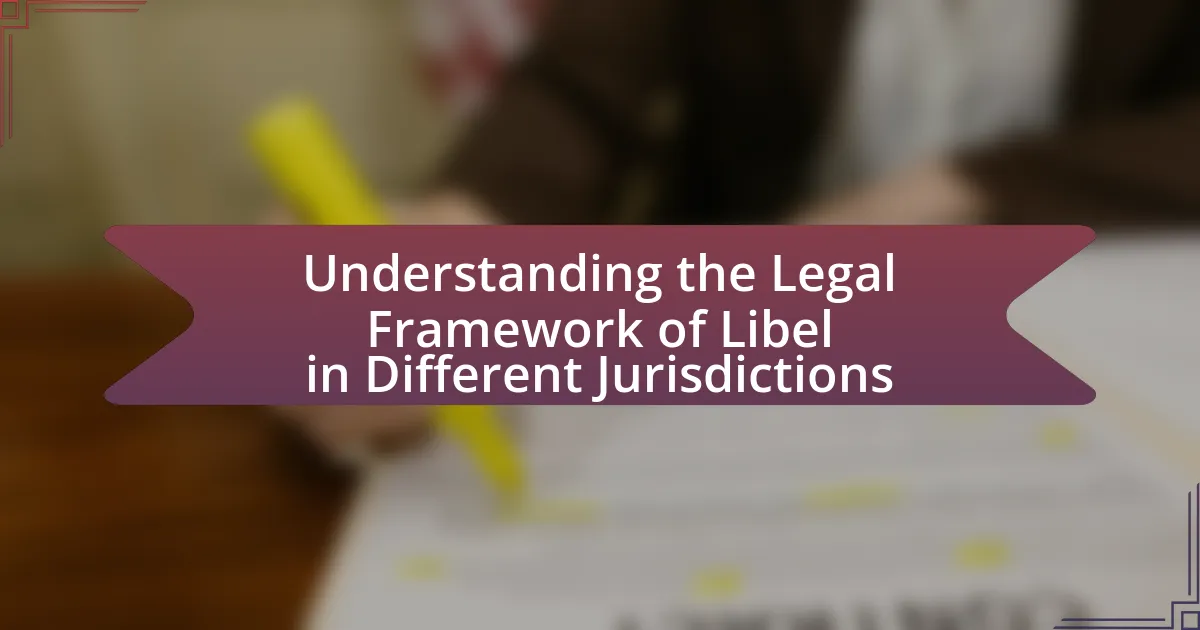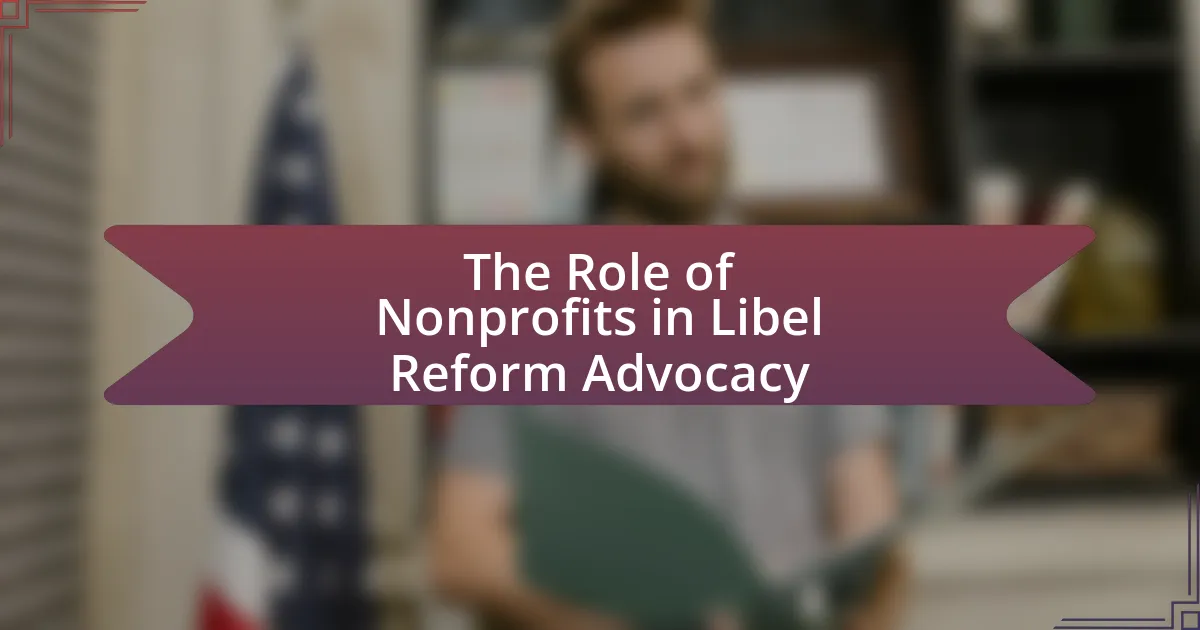Libel laws are legal statutes that protect individuals and entities from false statements that can harm their reputation. This article examines the purpose of libel laws, how they define false statements, and the criteria that determine whether a statement is considered libelous. It also explores the variations in libel laws across different jurisdictions, particularly between the United States and the United Kingdom, and discusses the implications of these laws on freedom of speech and public discourse. Additionally, the article highlights the impact of libel laws on journalism, the potential for reforms, and best practices for individuals and media to navigate these laws effectively.
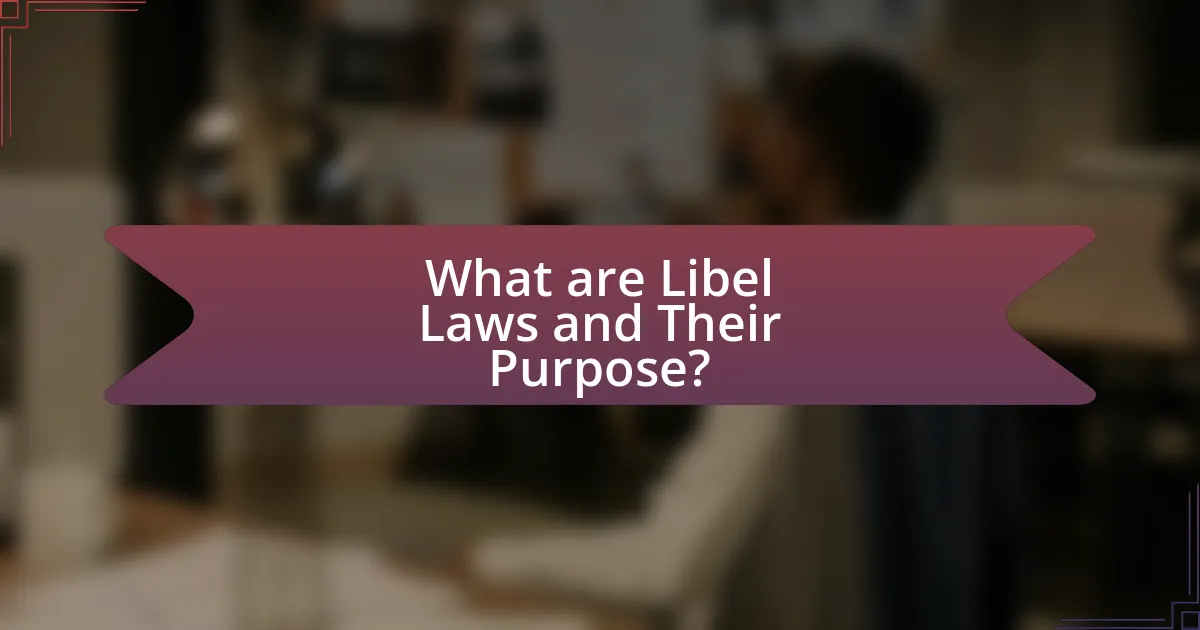
What are Libel Laws and Their Purpose?
Libel laws are legal statutes designed to protect individuals and entities from false statements that can harm their reputation. The primary purpose of these laws is to provide a remedy for those who have been defamed through written or published statements, ensuring that victims can seek damages for the harm caused. In the United States, for example, the First Amendment protects freedom of speech, but it does not shield individuals from making false statements that can damage another’s reputation. Courts often require the plaintiff to prove that the statement was false, damaging, and made with a certain level of fault, such as negligence or actual malice, depending on whether the plaintiff is a public or private figure. This legal framework balances the right to free expression with the need to protect individuals from reputational harm.
How do Libel Laws define false statements?
Libel laws define false statements as untrue assertions that damage an individual’s reputation. These statements must be presented as factual and must be published or communicated to a third party to qualify as libelous. For instance, if a newspaper publishes a false claim about a person committing a crime, that statement can be considered libel if it harms the person’s reputation and is not protected by a legal privilege or defense.
What criteria determine whether a statement is considered libelous?
A statement is considered libelous if it meets specific criteria: it must be a false statement presented as a fact, it must cause harm to an individual’s reputation, and it must be made with a certain level of fault, which varies depending on whether the subject is a private individual or a public figure. The falsehood of the statement is crucial, as truth is a defense against libel claims. Harm to reputation can be demonstrated through evidence of damage, such as loss of employment or social standing. The level of fault requires that the statement be made with negligence or actual malice, particularly when the subject is a public figure, as established in the landmark case New York Times Co. v. Sullivan (1964).
How do different jurisdictions interpret libel laws?
Different jurisdictions interpret libel laws based on their legal traditions, cultural values, and constitutional frameworks. For instance, in the United States, the First Amendment provides robust protections for free speech, requiring public figures to prove actual malice to win a libel case, as established in the landmark case New York Times Co. v. Sullivan (1964). Conversely, in the United Kingdom, the Defamation Act 2013 places the burden of proof on the defendant to show that their statements are true, reflecting a more restrictive approach to free speech. Additionally, countries like Canada balance free expression with protection against defamation, requiring a demonstration of harm to reputation while also considering the public interest in the speech. These variations illustrate how legal interpretations of libel can significantly impact the extent of freedom of speech in different regions.
Why are Libel Laws important for society?
Libel laws are important for society because they protect individuals from false statements that can harm their reputation. These laws serve as a legal framework that balances the right to free speech with the need to prevent defamation, ensuring that individuals can express opinions without fear of unjust harm to their character. For instance, in the United States, the landmark case New York Times Co. v. Sullivan established that public figures must prove actual malice to win a libel case, which underscores the importance of protecting robust debate while also holding individuals accountable for falsehoods. This legal protection fosters a more informed society by encouraging responsible discourse and discouraging the spread of misinformation.
What role do Libel Laws play in protecting individuals?
Libel laws play a crucial role in protecting individuals by providing legal recourse against false statements that can harm their reputation. These laws enable individuals to seek damages for defamation, ensuring that they can defend their character against untrue and damaging claims. For instance, in the United States, the landmark case New York Times Co. v. Sullivan established that public figures must prove actual malice to win a libel case, which underscores the balance between protecting reputations and safeguarding freedom of speech. This legal framework helps deter the spread of misinformation while allowing individuals to hold others accountable for harmful falsehoods.
How do Libel Laws balance reputation and freedom of expression?
Libel laws balance reputation and freedom of expression by establishing legal standards that protect individuals from false statements while allowing for open discourse. These laws require that a statement be proven false and damaging to a person’s reputation to qualify as libel, thus safeguarding truthful expression and opinions. For instance, in the United States, the landmark case New York Times Co. v. Sullivan (1964) set a high bar for public figures to prove libel, emphasizing the importance of free speech in political discourse. This case illustrates how libel laws aim to prevent the chilling effect on free expression while still providing recourse for those whose reputations are unjustly harmed.
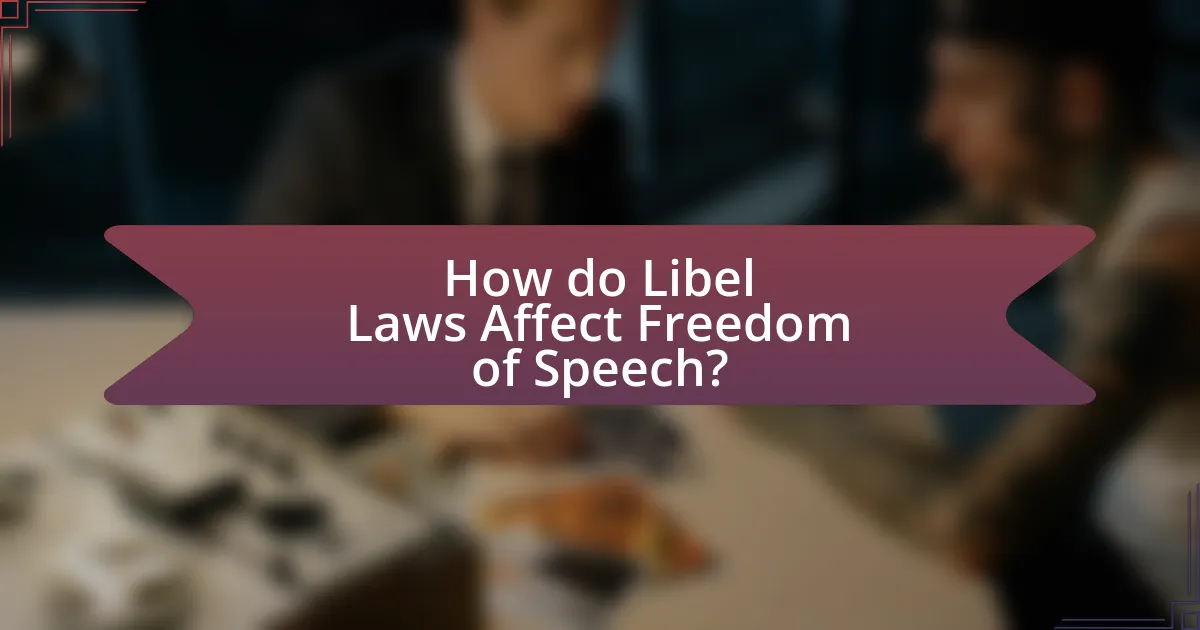
How do Libel Laws Affect Freedom of Speech?
Libel laws restrict freedom of speech by imposing legal consequences for false statements that damage an individual’s reputation. These laws create a chilling effect, where individuals may hesitate to express opinions or share information for fear of litigation. For instance, in the United States, the landmark case New York Times Co. v. Sullivan established that public figures must prove actual malice to win a libel case, which protects robust debate and criticism. However, in jurisdictions with less stringent standards, such as some European countries, the potential for libel suits can lead to self-censorship and a reduction in public discourse. Thus, while libel laws aim to protect individuals from defamation, they can simultaneously limit the scope of free expression.
What are the implications of Libel Laws on public discourse?
Libel laws significantly restrict public discourse by imposing legal consequences for false statements that harm an individual’s reputation. These laws create a chilling effect, discouraging individuals and media outlets from discussing controversial or sensitive topics due to fear of litigation. For instance, in the United States, the landmark case New York Times Co. v. Sullivan established that public figures must prove actual malice to win a libel case, which aims to protect robust debate but can still lead to self-censorship among speakers. Consequently, while libel laws are intended to protect reputations, they can inadvertently stifle free expression and limit the exchange of ideas in public forums.
How can fear of libel lawsuits deter individuals from speaking out?
Fear of libel lawsuits can significantly deter individuals from speaking out by instilling a concern over potential legal repercussions for expressing opinions or sharing information. This apprehension arises from the understanding that libel laws can impose severe financial penalties and damage reputations, leading individuals to self-censor their speech. For instance, a study by the American Civil Liberties Union highlights that the threat of litigation can create a chilling effect, where individuals refrain from discussing controversial topics or criticizing public figures due to fear of being sued for defamation. Consequently, this fear undermines open dialogue and restricts the free exchange of ideas, which are essential components of a democratic society.
What examples illustrate the chilling effect of Libel Laws on journalism?
Libel laws create a chilling effect on journalism by discouraging reporters from publishing potentially controversial stories due to fear of legal repercussions. For instance, the case of New York Times Co. v. Sullivan (1964) established that public figures must prove actual malice to win a libel case, which initially seemed to protect journalists. However, the threat of lawsuits still leads many media outlets to self-censor, avoiding critical coverage of powerful individuals or institutions. Additionally, in countries with stricter libel laws, such as the United Kingdom, journalists often face significant financial risks, leading to a decrease in investigative reporting. The high-profile case of the British libel lawsuit against The Guardian over its reporting on the phone-hacking scandal exemplifies how fear of litigation can stifle journalistic inquiry. These examples illustrate how libel laws can inhibit the free flow of information and limit the public’s access to important news.
How do Libel Laws vary across different countries?
Libel laws vary significantly across different countries, reflecting diverse legal traditions and cultural attitudes toward free speech. In the United States, for example, the First Amendment provides robust protections against libel claims, requiring public figures to prove actual malice, which is a high standard. Conversely, in the United Kingdom, the burden of proof lies with the defendant, making it easier for claimants to win libel cases. Additionally, countries like Germany and France have strict libel laws that can lead to severe penalties, including imprisonment, for defamatory statements. These differences illustrate how libel laws can either protect or restrict freedom of speech, depending on the jurisdiction.
What are the key differences in Libel Laws between the United States and the United Kingdom?
The key differences in libel laws between the United States and the United Kingdom are primarily centered around the burden of proof and the standards for public figures. In the United States, the plaintiff must prove actual malice when the case involves a public figure, as established in the landmark case New York Times Co. v. Sullivan (1964). This means that the plaintiff must demonstrate that the publisher acted with knowledge of the falsity of the statement or with reckless disregard for the truth. Conversely, in the United Kingdom, the burden of proof lies with the defendant, who must prove that the statement is true, making it easier for claimants to win libel cases. Additionally, UK law does not differentiate between public and private figures in the same way, allowing for broader protections against defamation. These differences significantly impact freedom of speech, with the US providing more robust protections for expression compared to the UK’s more claimant-friendly approach.
How do international standards influence national Libel Laws?
International standards significantly influence national libel laws by establishing benchmarks for freedom of expression and protection against defamation. For instance, the International Covenant on Civil and Political Rights (ICCPR) emphasizes the importance of free speech, which encourages countries to align their libel laws with these principles to avoid excessive restrictions. Countries often amend their laws to comply with international human rights obligations, reflecting a trend towards balancing the right to free speech with the need to protect individuals from false statements. This alignment is evident in various jurisdictions where national courts reference international standards when adjudicating libel cases, thereby reinforcing the global commitment to uphold freedom of expression while ensuring accountability for harmful speech.
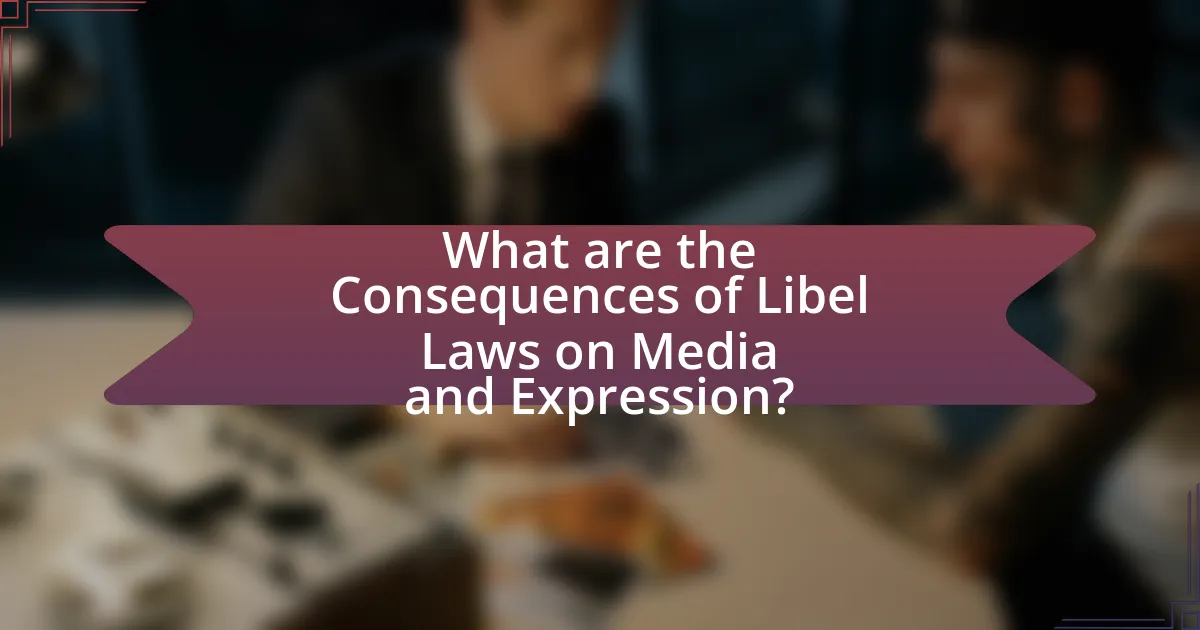
What are the Consequences of Libel Laws on Media and Expression?
Libel laws significantly restrict media and expression by imposing legal consequences for false statements that damage an individual’s reputation. These laws create a chilling effect, discouraging journalists and media outlets from reporting on sensitive topics due to fear of litigation. For instance, in the United States, the landmark case New York Times Co. v. Sullivan established that public figures must prove actual malice to win a libel case, which has led to a higher threshold for claims and greater protection for media expression. However, in countries with stricter libel laws, such as the United Kingdom, the burden of proof often lies with the defendant, resulting in increased self-censorship among journalists and a reduction in critical reporting. Thus, while libel laws aim to protect individuals from defamation, they can inadvertently undermine the freedom of the press and the public’s right to information.
How do Libel Laws impact journalistic practices?
Libel laws significantly impact journalistic practices by imposing legal consequences for publishing false statements that harm an individual’s reputation. Journalists must exercise caution in their reporting to avoid potential lawsuits, which can lead to self-censorship and a chilling effect on free expression. For instance, the landmark case New York Times Co. v. Sullivan established that public figures must prove actual malice to win a libel case, influencing journalists to prioritize accuracy and fact-checking in their work. This legal framework encourages responsible journalism but can also deter coverage of controversial topics due to fear of litigation.
What precautions do journalists take to avoid libel claims?
Journalists take several precautions to avoid libel claims, including fact-checking information, verifying sources, and using clear attribution. Fact-checking ensures that the information reported is accurate and reliable, reducing the risk of publishing false statements. Verifying sources involves confirming the credibility of individuals or documents before including their statements in a report, which helps to substantiate claims made in articles. Additionally, using clear attribution allows journalists to distinguish between their own opinions and those of others, thereby minimizing the potential for misrepresentation. These practices are essential in maintaining journalistic integrity and protecting against legal repercussions associated with libel.
How do Libel Laws affect the reporting of controversial topics?
Libel laws significantly restrict the reporting of controversial topics by imposing legal consequences for false statements that harm an individual’s reputation. Journalists and media outlets often exercise caution in their reporting to avoid potential lawsuits, which can lead to self-censorship and a reluctance to cover sensitive issues. For instance, the landmark case New York Times Co. v. Sullivan established that public figures must prove actual malice to win a libel case, which has influenced how media approaches reporting on public figures and controversial subjects. This legal framework creates a chilling effect, as the fear of litigation can deter thorough investigation and open discourse on contentious matters.
What are the potential reforms for Libel Laws?
Potential reforms for libel laws include raising the burden of proof for plaintiffs, implementing a public interest defense, and establishing clearer definitions of defamatory statements. Raising the burden of proof would require plaintiffs to demonstrate actual malice or negligence, which aligns with the standards set by the U.S. Supreme Court in New York Times Co. v. Sullivan (1964). Implementing a public interest defense would protect journalists and commentators when discussing matters of public concern, thereby enhancing freedom of speech. Clearer definitions of defamatory statements would reduce ambiguity and help prevent frivolous lawsuits, which can chill free expression. These reforms aim to balance the protection of individual reputations with the fundamental right to free speech.
How can reforms enhance freedom of speech while protecting reputations?
Reforms can enhance freedom of speech while protecting reputations by implementing clearer standards for defamation and promoting a balance between free expression and individual rights. For instance, reforms could establish a higher threshold for proving defamation, requiring plaintiffs to demonstrate actual malice or reckless disregard for the truth, as seen in the landmark U.S. Supreme Court case New York Times Co. v. Sullivan (1964). This case set a precedent that protects journalists and public figures, allowing for more robust public discourse without the fear of frivolous lawsuits. Additionally, reforms could encourage the use of retraction and correction mechanisms, which allow individuals to address false statements without resorting to litigation, thus fostering a culture of accountability while preserving free speech.
What role do advocacy groups play in shaping Libel Law reforms?
Advocacy groups play a crucial role in shaping libel law reforms by lobbying for changes that protect freedom of speech and prevent the misuse of libel laws to silence dissent. These organizations often conduct research, raise public awareness, and mobilize grassroots campaigns to highlight the negative impacts of overly restrictive libel laws on free expression. For instance, the American Civil Liberties Union (ACLU) has actively participated in legal battles and public discourse to advocate for reforms that balance the rights of individuals to protect their reputation with the need for robust free speech protections. Their efforts have contributed to significant legal precedents and legislative changes that promote transparency and accountability in media reporting, thereby reinforcing the principle that free speech is essential for a democratic society.
What best practices can individuals and media follow to navigate Libel Laws?
Individuals and media can navigate libel laws effectively by adhering to the principles of truth, fair comment, and responsible journalism. Truth serves as a complete defense against libel claims, meaning that verifying facts before publication is crucial. Fair comment allows for opinions on matters of public interest, provided they are based on true facts and are not malicious. Responsible journalism involves thorough research, fact-checking, and obtaining multiple sources to ensure accuracy, which minimizes the risk of publishing defamatory statements. According to the New York Times Co. v. Sullivan case, public figures must prove actual malice to win a libel case, emphasizing the importance of intent and knowledge in reporting.
